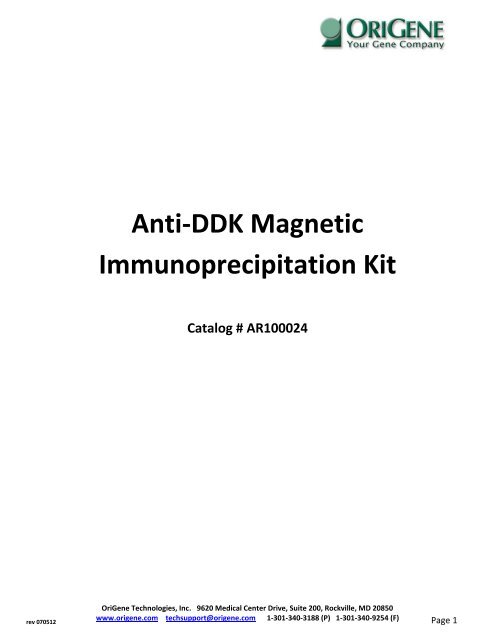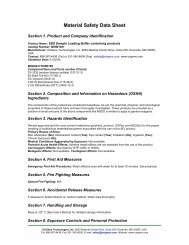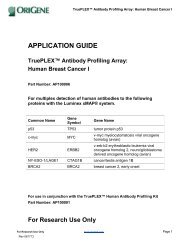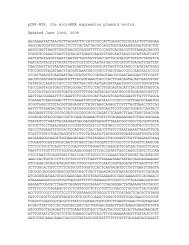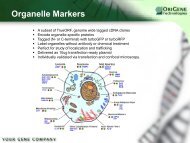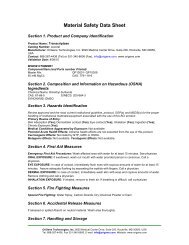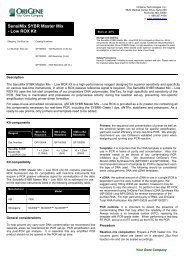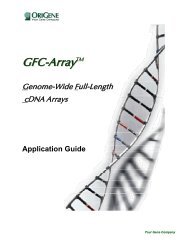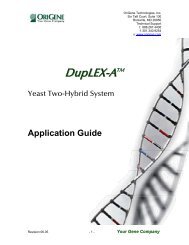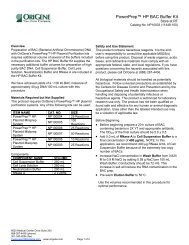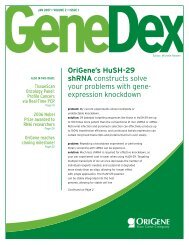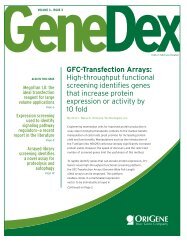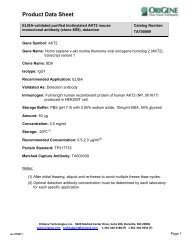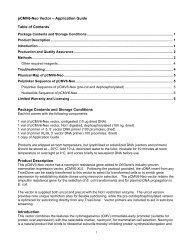Manual - OriGene
Manual - OriGene
Manual - OriGene
You also want an ePaper? Increase the reach of your titles
YUMPU automatically turns print PDFs into web optimized ePapers that Google loves.
Anti-DDK Magnetic<br />
Immunoprecipitation Kit<br />
Catalog # AR100024<br />
rev 070512<br />
<strong>OriGene</strong> Technologies, Inc. 9620 Medical Center Drive, Suite 200, Rockville, MD 20850<br />
www.origene.com techsupport@origene.com 1-301-340-3188 (P) 1-301-340-9254 (F) Page 1
Anti-DDK Magnetic Immunoprecipitation Kit ................................................................ 3<br />
Materials Supplied: ..................................................................................................................... 3<br />
Storage of reagents: .................................................................................................................... 3<br />
Materials Required but Not Supplied Kit: ................................................................................... 4<br />
Materials Recommended for Western Blot Analysis:................................................................. 4<br />
Cell Lysate Production ..................................................................................................... 4<br />
Immunoprecipitation Protocol ......................................................................................... 5<br />
Preparation of Materials and Buffers ......................................................................................... 5<br />
Detailed Immunoprecipitation Procedure .................................................................................. 5<br />
Immunoprecipitation Controls ................................................................................................... 6<br />
Western Blot Analysis: ................................................................................................................ 7<br />
Troubleshooting ................................................................................................................ 8<br />
Frequently Asked Questions ........................................................................................... 9<br />
rev 070512<br />
<strong>OriGene</strong> Technologies, Inc. 9620 Medical Center Drive, Suite 200, Rockville, MD 20850<br />
www.origene.com techsupport@origene.com 1-301-340-3188 (P) 1-301-340-9254 (F) Page 2
Anti-DDK Magnetic Immunoprecipitation Kit<br />
Immunoprecipitation is a technique designed to affinity purify proteins or protein complexes<br />
through the use of a highly specific antibody. This technique can successfully concentrate or<br />
precipitate a particular protein from a cell lysate or mixture of proteins. It is one of the most<br />
widely used molecular biology methodologies to investigate protein activation, protein posttranslational<br />
modifications, and protein-protein interactions or co-immunoprecipitation.<br />
<strong>OriGene</strong>’s highly specific anti-DDK mouse monoclonal antibody (4C5) recognizes the DYKDDDDK<br />
epitope tag which is the same as the Sigma Flag tag. The 4C5 antibody is covalently coupled<br />
to magnetic beads and has been validated for use in immunoprecipitation and coimmunoprecipitation<br />
experiments. For efficient binding with the anti-DDK magnetic beads, the<br />
target protein must contain a carboxy-terminus fused DDK epitope tag. For expression and<br />
immunoprecipitation of human proteins we recommend the use of cDNA clones from<br />
<strong>OriGene</strong>’s TrueORF clone collection which all contain the appropriate DDK epitope tag.<br />
Alternatively, <strong>OriGene</strong> can provide a custom clone containing the appropriate tag or DDKtagged<br />
proteins can be immunoprecipitated directly from any of <strong>OriGene</strong>’s >17,000 human<br />
over-expression lysates.<br />
The kit also includes Control Beads that have been coupled to non-immune mouse IgG. The<br />
control beads can be used to pre-clear the sample by binding to proteins that may bind nonspecifically<br />
to mouse IgG. The control beads may also be used as a direct comparison to the<br />
anti-DDK beads in order to demonstrate that the immunoprecipitation is specific for the<br />
epitope tag.<br />
Materials Supplied:<br />
Description<br />
Anti-DDK Magnetic Beads<br />
Control (mouse IgG) Magnetic Beads<br />
1X Lysis Buffer<br />
10X Wash Buffer<br />
2X SDS-PAGE Sample Buffer (nonreducing)<br />
BSA-DDK Control Protein (1 mg/ml)<br />
Amount<br />
1.25 mL<br />
1.25 mL<br />
250 mL<br />
50 mL<br />
1.5 mL<br />
50 L<br />
Storage of reagents:<br />
The Immunoprecipitation Kit is shipped on blue ice. Upon receipt, the BSA-DDK control protein<br />
should be stored at -20ºC until use. All other reagents supplied in the Immunoprecipitation Kit<br />
should be stored at 2-8ºC.<br />
rev 070512<br />
<strong>OriGene</strong> Technologies, Inc. 9620 Medical Center Drive, Suite 200, Rockville, MD 20850<br />
www.origene.com techsupport@origene.com 1-301-340-3188 (P) 1-301-340-9254 (F) Page 3
Materials Required but Not Supplied Kit:<br />
Description<br />
Protease Inhibitor Cocktail<br />
Dithiothreitol (DTT)<br />
-mercaptoethanol<br />
Magnetic Separation Stand<br />
Recommended Source<br />
Sigma #P2714 or equivalent.<br />
Sigma #646563 or equivalent.<br />
Sigma #M3148 or equivalent.<br />
Thermo Fisher Scientific #PI-21359 or equivalent.<br />
Materials Recommended for Western Blot Analysis:<br />
Description<br />
4C5 anti-DDK, peroxidase conjugate<br />
Nitrocellulose or PVDF Membrane<br />
Luminol Reagent<br />
Myc/DDK tagged Molecular Weight Markers<br />
Recommended Source<br />
<strong>OriGene</strong> Technologies Inc, TA150030<br />
Bioexpress, F-3139-3 or F-3112-30<br />
<strong>OriGene</strong> Technologies Inc, TA10016<br />
<strong>OriGene</strong> Technologies Inc, MWM1001<br />
Cell Lysate Production<br />
1. Transfect a 50-70% confluent monolayer of cells with plasmid DNA using an appropriate<br />
transfection agent. For expression of human proteins in HEK293 cells we recommend<br />
the use of <strong>OriGene</strong>’s TrueORF clones in combination with Turbofectin 8.0 transfection<br />
reagent. Optimal transfection results for specific cell types should be experimentally<br />
determined by the end user. Alternatively, proteins can be immunoprecipitated from<br />
over 17,000 human over-expression lysates offered by <strong>OriGene</strong>.<br />
2. Incubate transfected cells for 24-48 hours.<br />
3. Remove cell culture media supernatant from culture dish. Wash cells with sterile 1X<br />
PBS, pH 7.4 to completely remove all media from the culture dish.<br />
4. Prepare 1X Lysis Buffer containing 1X Protease Inhibitors (see Preparation of Materials<br />
and Buffers, below). Add 1ml of 1X Lysis Buffer per 100 mm petri dish (10 6 – 10 7 ) cells.<br />
5. Pipette up and down or agitate using a cell scraper to thoroughly remove all cells from<br />
the culture dish. Add the cell lysis buffer containing removed cells to a 1.5 ml Eppendorf<br />
tube.<br />
6. Incubate on ice for 20 minutes.<br />
7. Clear the cell lysate by centrifugation at 12,000 – 14,000 x g for 5 minutes.<br />
8. Transfer the cell lysate supernatant to a new 1.5 ml Eppendorf tube. Store cell lysate at<br />
-70ºC to -80ºC until ready for use.<br />
rev 070512<br />
<strong>OriGene</strong> Technologies, Inc. 9620 Medical Center Drive, Suite 200, Rockville, MD 20850<br />
www.origene.com techsupport@origene.com 1-301-340-3188 (P) 1-301-340-9254 (F) Page 4
Immunoprecipitation Protocol<br />
The following protocol is for a single immunoprecipitation reaction. For multiple individual<br />
immunoprecipitation reactions or bulk reactions, adjust reagent volumes according to the<br />
number of experimental samples to be processed. The optimal working conditions should be<br />
determined by the end user.<br />
Preparation of Materials and Buffers<br />
1. Prepare Wash Buffer by diluting 10X Wash Buffer to 1X with deionized water. Store<br />
diluted wash buffer at 2-8ºC for up to one month.<br />
2. Prepare a 100X Protease Inhibitor Stock by dissolving the contents of one vial (Sigma<br />
#P2714) in 1 mL of sterile deionized water. The 100X Protease Inhibitor Stock should be<br />
stored at -20ºC until ready for use.<br />
3. Prepare 1X Lysis Buffer containing 1X Protease Inhibitors. Store 1X Lysis Buffer with<br />
Protease Inhibitors at 2-8ºC for up to one month.<br />
4. For a positive control, add 10 l of BSA-DDK control protein to 490 l of 1X Lysis Buffer<br />
containing protease inhibitors. Use this mixture in the immunoprecipitation below.<br />
5. Prepare 2X SDS-PAGE Sample Buffer (nonreducing) by incubating at 37C for 10 minutes<br />
to completely thaw. To make a reducing buffer, add a reducing agent to a final<br />
concentration of 0.1M Dithiothreitol (DTT) or 5% -mercaptoethanol.<br />
Detailed Immunoprecipitation Procedure<br />
Optional Pre-clear Procedure:<br />
1. Pipette 25 l of Control Magnetic Beads into 1 ml of 1X Lysis Buffer and mix thoroughly.<br />
2. Place the sample onto a magnetic separation stand for one minute to magnetically<br />
separate the beads. Discard supernatant.<br />
3. Prepare the sample by diluting 50 l of cell lysate with 450 l of 1X Lysis Buffer. Add the<br />
lysate or protein to the tube containing the washed magnetic beads.<br />
4. Place the mixture on a rotator and incubate at room temperature for 1 - 2 hours.<br />
5. Place the sample onto a magnet separation stand for one minute to magnetically<br />
separate the beads.<br />
6. Remove supernatant for use in the Immunoprecipitation Procedure.<br />
rev 070512<br />
<strong>OriGene</strong> Technologies, Inc. 9620 Medical Center Drive, Suite 200, Rockville, MD 20850<br />
www.origene.com techsupport@origene.com 1-301-340-3188 (P) 1-301-340-9254 (F) Page 5
Immunoprecipitation Procedure:<br />
1. Pipette 25 l of anti-DDK magnetic beads into 1 ml of 1X Lysis Buffer and mix<br />
thoroughly.<br />
2. Place the sample onto a magnetic separation stand for one minute to magnetically<br />
separate the beads. Discard supernatant.<br />
3. Prepare the sample by diluting 50 l of cell lysate with 450 l of 1X Lysis Buffer. This<br />
step is not necessary if using pre-cleared supernatant from above.<br />
4. Add the pre-cleared supernatant, prepared lysate or diluted protein to the tube<br />
containing the washed anti-DDK magnetic beads.<br />
5. Place the mixture on a rotator and incubate at 2-8ºC for 2 hours to overnight.<br />
6. Place the sample onto a magnetic separation stand for one minute to magnetically<br />
separate the beads. Remove the supernatant (the flow-through) and save for analysis.<br />
7. Wash magnetic beads three times with 1 ml of 1X Wash Buffer. Each time, place the<br />
sample onto a magnet stand for one minute to magnetically separate the beads.<br />
Carefully remove the supernatant after each wash.<br />
8. After the final wash, add 25 l of 2X SDS-PAGE Sample Buffer to the magnetic beads and<br />
mix by pipetting up and down. Store the sample at -70ºC to -80ºC until Western Blot<br />
analysis. In most cases, separation of buffer from beads is not critical however the<br />
sample storage should be determined by the end user.<br />
Immunoprecipitation Controls<br />
Recommended Controls<br />
BSA-DDK Protein Control<br />
No Protein Control<br />
Positive Lysate Control<br />
Negative Lysate Control<br />
Control Magnetic Beads<br />
Effect<br />
The DDK tagged BSA protein can be used as a positive control.<br />
No protein added to the Lysis Buffer can be used as a negative<br />
control.<br />
A different cell lysate containing a DDK tag at the carboxyterminus<br />
can be used as a positive control.<br />
A negative cell lysate (i.e. GFP transfected cells or other<br />
overexpression lysate) can be used as a negative control.<br />
Non-immune Mouse IgG control magnetic beads are supplied<br />
in the kit as a negative control for the immunoprecipitation<br />
and for pre-clearing the sample.<br />
rev 070512<br />
<strong>OriGene</strong> Technologies, Inc. 9620 Medical Center Drive, Suite 200, Rockville, MD 20850<br />
www.origene.com techsupport@origene.com 1-301-340-3188 (P) 1-301-340-9254 (F) Page 6
Western Blot Analysis:<br />
For detection of immunoprecipitated proteins, we recommend using the 4C5 anti-DDK,<br />
peroxidase conjugate (<strong>OriGene</strong>, TA150030) for an easy, highly sensitive one step detection<br />
reagent for Western Blotting. The 4C5 anti-DDK, peroxidase conjugate eliminates the need for<br />
secondary antibodies that can potentially cross-react with non-specific proteins in the sample<br />
and allows for direct detection of the epitope-tagged protein with minimal background.<br />
For co-immunoprecipitation, use a gene-specific antibody as the primary antibody in the<br />
Western Blot, followed by a species-specific HRP conjugate. The gene specific antibody will<br />
recognize the target protein if it is bound to the DDK-tagged protein in the sample. This<br />
powerful technique can be used for the discovery of specific protein-protein interactions.<br />
Immunoprecipitation Example<br />
Human ERCC1-Myc/DDK plasmid (<strong>OriGene</strong> Cat# RC200478) was transiently transfected<br />
into HEK293T cells. Cell lysate preparation and immunoprecipitation were performed<br />
using the above protocol. Western Blot detection was performed using the 4C5 anti-<br />
DDK, peroxidase conjugate (<strong>OriGene</strong>, TA150030). DDK-tagged ERCC1 protein was<br />
detected in the undiluted lysate, the diluted input sample, and the anti-DDK<br />
immunoprecipitated. Only a trace of ERCC1 protein is detected in the flow-through<br />
indicating that nearly 100% of the tagged protein was captured by the anti-DDK beads.<br />
rev 070512<br />
<strong>OriGene</strong> Technologies, Inc. 9620 Medical Center Drive, Suite 200, Rockville, MD 20850<br />
www.origene.com techsupport@origene.com 1-301-340-3188 (P) 1-301-340-9254 (F) Page 7
Troubleshooting<br />
Problem Cause Solution<br />
Low<br />
Expression of<br />
tagged<br />
protein in<br />
cell lysate<br />
Small<br />
magnetic<br />
bead pellet<br />
Western blot<br />
has failed<br />
Nonspecific<br />
bands<br />
present in<br />
SDS-PAGE gel<br />
or Western<br />
blot<br />
Clone has wrong DNA sequence<br />
Clone is poorly expressed<br />
and/or toxic<br />
Transfection did not work<br />
Magnetic beads not prepared<br />
correctly<br />
Magnetic beads lost during washes<br />
Western blot problems<br />
Cell lysate samples not pre-cleared<br />
Sequence your clone to ensure<br />
there are no mutations and that<br />
the DDK epitope tag is in frame<br />
with the gene coding sequence.<br />
The stop codon must be removed.<br />
Reduce the volume of 1X Lysis<br />
Buffer used for cell lysis after<br />
transfection.<br />
The DNA-to-Transfection Reagent<br />
ratio needs to be optimized. See<br />
manufacturer’s instructions for cell<br />
transfection troubleshooting.<br />
Pipette magnetic beads up and<br />
down to prevent bead settling.<br />
Beads should be homogenous<br />
before use.<br />
Pipette carefully to discard<br />
supernatant after each wash. Do<br />
not disrupt bead pellet during this<br />
step.<br />
Each IP sample should be<br />
magnetically separated on the<br />
magnet stand for a minimum of<br />
one minute to ensure beads are<br />
separated.<br />
Here is an example Western Blot<br />
Protocol.<br />
Pre-clear your IP samples by<br />
incubating each cell lysate with<br />
Control Magnetic Beads (supplied<br />
in Kit) for 1-24 hours at room<br />
temperature.<br />
rev 070512<br />
<strong>OriGene</strong> Technologies, Inc. 9620 Medical Center Drive, Suite 200, Rockville, MD 20850<br />
www.origene.com techsupport@origene.com 1-301-340-3188 (P) 1-301-340-9254 (F) Page 8
Problem Cause Solution<br />
Magnetic beads need to be preblocked<br />
Magnetic beads not thoroughly<br />
washed<br />
Pre-block the anti-DDK magnetic<br />
beads in 5% BSA or non-fat milk<br />
prior to incubation with your precleared<br />
sample.<br />
Wash magnetic beads once in 1X<br />
Lysis Buffer to remove storage<br />
buffer before use.<br />
Wash magnetic beads three times<br />
in 1X Wash Buffer before eluting in<br />
SDS-PAGE Sample Buffer for gel<br />
analysis.<br />
Magnetic beads loaded into SDS-<br />
PAGE gel<br />
Western blot membrane not<br />
thoroughly washed.<br />
After boiling your IP sample in SDS-<br />
PAGE Sample Buffer, magnetically<br />
separate on a magnetic stand. This<br />
will minimize bead loading into<br />
your SDS-PAGE gel.<br />
Here is an example Western Blot<br />
Protocol. If the nonspecific bands<br />
are still present, do a high salt<br />
wash (1X Wash Buffer containing<br />
500mM NaCl) for 5 minutes prior<br />
to developing.<br />
Frequently Asked Questions<br />
Q1: Can anti-DDK magnetic beads be used for purifying DDK-tagged proteins?<br />
A1: Yes, but we recommend the magnetic beads be used only for purposes of<br />
immunoprecipitation and co-immunoprecipitation.<br />
Q2: How much beads should I use for my immunoprecipitation experiments?<br />
A2: We recommend using 25 l of beads per immunoprecipitation sample. However, the<br />
optimal amount of beads is dependent upon the cell type and the protein expression level. The<br />
optimal beads volume should be determined experimentally by the end user.<br />
rev 070512<br />
<strong>OriGene</strong> Technologies, Inc. 9620 Medical Center Drive, Suite 200, Rockville, MD 20850<br />
www.origene.com techsupport@origene.com 1-301-340-3188 (P) 1-301-340-9254 (F) Page 9
Q3: What are the advantages of using <strong>OriGene</strong>’s anti-DDK magnetic beads compared to Flag<br />
magnetic beads?<br />
A3: Our anti-DDK magnetic beads have been optimized to work with all of our 12,500<br />
TrueORF Gold premium cDNA clones. Our TrueORF Gold clones contain the DDK epitope tag<br />
fused at the carboxy-terminus allowing for easy detection and immunprecipitation of any gene<br />
in the human genome. Additionally, our anti-DDK magnetic beads are a superior tool for the<br />
discovery of protein-protein interactions by co-immunoprecipitation.<br />
rev 070512<br />
<strong>OriGene</strong> Technologies, Inc. 9620 Medical Center Drive, Suite 200, Rockville, MD 20850<br />
www.origene.com techsupport@origene.com 1-301-340-3188 (P) 1-301-340-9254 (F) Page 10


